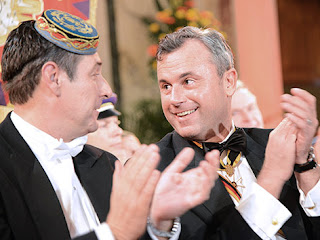Austria's post-war political system of perpetual compromise and Grand Coalitions is crumbling down as polarization and right-wing populism is increasingly dominating the discourse in the Alpine Republic. The established government coalition parties, the Social Democrats (SPÖ) of Chancellor Werner Faymann, and the conservative People's Party (ÖVP), have suffered disastrous defeats.
On the eve of the 71st anniversary of the liberation of Italy from fascism (April 25th, 1945), north of its borders a neo-fascist candidate, Norbert Hofer (FPÖ), has come out on top in the first round of Austrian presidential elections with more than a third (35%) of all votes, winning more than the candidates of both “established“ parties together. An independent-Green-centrist candidate, Alexander van der Bellen, came a distant second at just over 21%. A run-off ballot will be held between the two of them in four weeks, on May 22nd.
The government coalition parties' candidates have only
come in third and fourth, respectively, barely reaching double
digit percentages (although in a way, they had already anticipated
this, by not nominating their party leaders or charismatic
personalities, but merely second- or third-rate party stooges), with an (at least rhetorically) "anti-establishment" candidate (Hofer) winning
big and an independent candidate (van der Bellen) coming in second.
In what is the best election result on the federal level ever (35%) for the extreme right-wing Freedom Party of Austria (FPÖ), the party won the first round of the presidential elections by a margin of more than 10%, with Alexander van der Bellen, a professor of economics, officially an independent candidate, but supported by the Green Party, coming in second at around 22%, thus being the candidate who will face off against Hofer in the run-off in four weeks. Although the anti-FPÖ polarization of the left-leaning voters will certainly lead to a closer race then, it is doubtful if van der Bellen can rally all of them and also especially the centrist (i.e. Christian Conservative ÖVP) voters behind him, including those of Irmgard Griss, a former judge and also independent candidate, but more right of centre than Mr van der Bellen. She garnered mostly bourgeois, rural voters, but also from Vienna's inner city as well as the rich suburbs, and came in a close third, with just under 19% of the votes, thus narrowly missing out on the participation in the run-off. Demoted to also-rans were the the Social Democrat Rudolf Hundstorfer (11,3%) and the People's Party's Andreas Khol (11,1%). Richard Lugner, a(n) (in)famous Viennese construction engineer, socialite, and self-declared "Kasper" ("joker" or "court jester"), also presenting himself as “anti-establishment“, got 2,3%.
Norbert Hofer, an aviation technician, was launched as a candidate who previously was not widely known in the political sphere of Austria outside of his native state („Land“) of Burgenland, and was initially seen as a pro forma candidate even by his own party. Now he set up everyone, against all predictions and polls reaping the “grapes of wrath“ directed against the said “political establishment“ in a country that has had a penchant for right-wing populist positions for decades.
In what is the best election result on the federal level ever (35%) for the extreme right-wing Freedom Party of Austria (FPÖ), the party won the first round of the presidential elections by a margin of more than 10%, with Alexander van der Bellen, a professor of economics, officially an independent candidate, but supported by the Green Party, coming in second at around 22%, thus being the candidate who will face off against Hofer in the run-off in four weeks. Although the anti-FPÖ polarization of the left-leaning voters will certainly lead to a closer race then, it is doubtful if van der Bellen can rally all of them and also especially the centrist (i.e. Christian Conservative ÖVP) voters behind him, including those of Irmgard Griss, a former judge and also independent candidate, but more right of centre than Mr van der Bellen. She garnered mostly bourgeois, rural voters, but also from Vienna's inner city as well as the rich suburbs, and came in a close third, with just under 19% of the votes, thus narrowly missing out on the participation in the run-off. Demoted to also-rans were the the Social Democrat Rudolf Hundstorfer (11,3%) and the People's Party's Andreas Khol (11,1%). Richard Lugner, a(n) (in)famous Viennese construction engineer, socialite, and self-declared "Kasper" ("joker" or "court jester"), also presenting himself as “anti-establishment“, got 2,3%.
Norbert Hofer, an aviation technician, was launched as a candidate who previously was not widely known in the political sphere of Austria outside of his native state („Land“) of Burgenland, and was initially seen as a pro forma candidate even by his own party. Now he set up everyone, against all predictions and polls reaping the “grapes of wrath“ directed against the said “political establishment“ in a country that has had a penchant for right-wing populist positions for decades.

